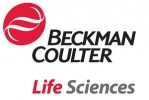Neuropathologists at Glasgow's Southern General Hospital use the Beckman Coulter CEQ 8000 genetic analysis system to examine brain tumour samples
Identification of loss of heterozygosity (LOH) helps oncologists identify those patients whose malignancy is most likely to respond to chemotherapy.
Tumours which appear histologically identical may exhibit very different clinical behaviour, including divergent responses to therapy.
Classifying tumours by loss of heterozygosity enables identification of tumours which will respond to chemotherapy.
Using the CEQ 8000 system, the Glasgow team identify LOH by comparing a patient's brain tumour tissue with their own normal cells obtained from a small blood sample or a buccal swab.
Thomas Kerr working with Willie Stewart in Neuropathology at the Southern General Hospital, Glasgow, explains: "By screening patients using the CEQ 8000 to analyse LOH we can identify those for whom chemotherapy has the potential to add 8-10 years to their lives.
"Our hope is to offer a referral service to neuropathology centres further afield, so targeting limited NHS resources more effectively and allowing neuro-oncology services outwith the region access to this investigation when planning patient management".
Part of Beckman Coulter's GenomeLab family of products, the CEQ 8000 series builds on more than a decade of innovation in laboratory automation and capillary electrophoresis technology, automating and integrating the majority of genetic analysis functions into one flexible, easy-to-use system.
CEQ software delivers high-precision sizing of amplified DNA fragments with accurate allele assignment and locus identification, and automatic analysis of LOH.





